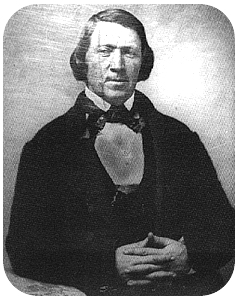Heritage Gateways
Official Sesquicentennial K-12 Education Projectsponsored by the Utah State Board of Education, the BYU-Public School Partnership and the Utah Education Network
Pioneer Date Summary
05/18/1847 - Crockett
 Location: Lemoyne, Nebraska - Location: 41:16:21N 101:48:46W
Location: Lemoyne, Nebraska - Location: 41:16:21N 101:48:46W
Date: May 18, 1847
On the North Platte River, Nebraska:
Brigham Young called the camp together at 7:30 a.m. for instructions.
He stated that he did not want to see any more buffalo killed,
nor anything larger than a duck. He spoke out against those who
were leaving meat on the ground becuse it was not the choisest
portion. "For God has given us a commandment that we should not
waste meat, nor take life unless it is needful." He said, "Save
your powder and lead and let the game alone." He also stated that
life was as dear to the animal, according to their understanding,
as it was to us. "The Spirit of the hunter as was now manifested
would lead them to kill all the game within a thousand miles as
inconsistently as the butcher would apply the knife to the throat
of a bullock." He reproved the horsemen for taking so little interest
in looking for roads. He also chastised the officers for not enforcing
the camp rules.
When the pioneers started out, the hunters and horseman went forward to pick out the road instead of going hunting. Wilford Woodruff commented, "I did not hear a gun fired on the road during the day." During the morning journey, the pioneers crossed a rapid stream, about twenty feet wide, which they called Rattlesnake Creek. William Clayton recorded: "Rattlesnake creek was so named from the following incident: President Young, as he rode up to the banks of the creek discovered that his horse stepped within a foot of a very large rattlesnake. He turned his horse away without harming it. Soon afterward, one of the brethren [Thomas Woolsey] came up on foot and stepped within two feet and a half of it. It immediately coiled up and sprang at him and would have struck him (as it sprang 2 1/2 feet) had he not jumped to one side. He took his rifle and shot the snake dead." It measure about four and a half feet long and had seven rattles.
They passed Cedar Bluffs, which are on the south side of the Platte. Orson Pratt observed: "These bluffs make up to the river, and are thinly covered with small cedars. In the bluffs on the south side of the river, for a few miles, appear to be some rock formations." This was the first time they saw ledges or rocks in the bluffs.
During the afternoon thunder showers passed around the company in various directions. They traveled about sixteen miles and formed the encampment on the west bank of a stream about eight feet wide and one foot deep. Stephen Markham called the camp together to remind them of their duty in regard to traveling and caring for their teams. He spoke out against "the selfish principle of a man bringing up his own cattle & leaving his brother's horse or ox, for fear of walking ten rods, to save his brother one, two, or three miles journey after it."
Winter Quarters, Nebraska:
Hosea Stout was having difficulties raising the city guard. Many
did not want to serve unless they could be assured that they would
be paid as promised. Brother Stout tried to get the attention of
those in authority to help them understand his frustrations, but
they did not take any action. Finally he decided to just dismiss
the guard, asking them to be ready for an emergency. Brother Stout
decided to go hunting. As he was traveling, he passed by John Taylor,
who has him about the guard. Brother Stout explained the problem
to him and Elder Taylor stated that he wanted the guard assembled
and went to help Brother Stout.
Summer Quarters, Nebraska:
Isaac Morley, who had authority over the Summer Quarters settlement
came up from Winter Quarters to inspect the progress of the farm.
He was very pleased and stated that more land had been broken and
corn planted at Summer Quarters than all the region around Winter
Quarters. In the evening a party was held at John D. Lee's house
with dancing and music.
Company B, Mormon Battalion, at San Diego,
California:
A Mexican wedding was held in town. Robert S. Bliss wrote: "They
celebrated it with the firing of Guns we gave them a gun from the
Ford while our officer was gone to Town; the Wedding ended with a
Fandango at night. It probably cost Mr. Barker $500 considering all
expenses (one cannon burst)."
Kearny Mormon Battalion detachment, California:
The small detachment of battalion men who were to travel with General Kearny
to Fort Leavenworth, passed the Mission of San Tenara on their way to Monterey.
They took prisoner a soldier who deserted from Monterey.
Source: 150 Years Ago Today ©These materials have been created by David R. Crockett. Copies of these materials may be reproduced for teacher and classroom use. When distributing these materials, credit must be given to David R. Crockett. These materials may not be published, in whole or part, or in any other format, without the written permission of Mr. Crockett, Tucson Az, crockett@goodnet.com.Sources:
- Watson, ed., The Orson Pratt Journals, 399
- Luke S. Johnson Journal, typescript, BYU, 8
- Erastus Snow Journal Excerpts, Improvement Era 14:1023
- Wilford Woodruff's Journal, 3:178
- Howard Egan's Diary, Pioneering the West, 43
- William Clayton's Journal, 156-60
- Bagley, ed., The Pioneer Camp of the Saints, 158-59
- Brooks, On the Mormon Frontier, The Diary of Hosea Stout, 1:256
- Kelly, ed., Journals of John D. Lee, 1846-1847 and 1859, 166
- The Journal of Robert S. Bliss, Utah Historical Quarterly, 4:93
- The Journal of Nathaniel V. Jones, Utah Historical Quarterly, 4:17